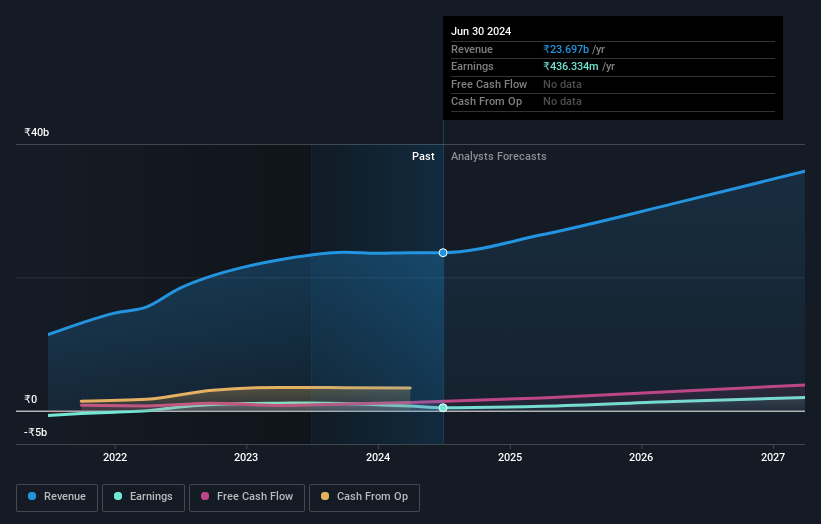- India
- /
- Hospitality
- /
- NSEI:WESTLIFE
Westlife Foodworld (NSE:WESTLIFE) stock performs better than its underlying earnings growth over last five years

When you buy shares in a company, it's worth keeping in mind the possibility that it could fail, and you could lose your money. But when you pick a company that is really flourishing, you can make more than 100%. For instance, the price of Westlife Foodworld Limited (NSE:WESTLIFE) stock is up an impressive 202% over the last five years. And in the last week the share price has popped 6.4%. But this might be partly because the broader market had a good week last week, gaining 3.7%.
On the back of a solid 7-day performance, let's check what role the company's fundamentals have played in driving long term shareholder returns.
Check out our latest analysis for Westlife Foodworld
Given that Westlife Foodworld only made minimal earnings in the last twelve months, we'll focus on revenue to gauge its business development. As a general rule, we think this kind of company is more comparable to loss-making stocks, since the actual profit is so low. It would be hard to believe in a more profitable future without growing revenues.
In the last 5 years Westlife Foodworld saw its revenue grow at 16% per year. Even measured against other revenue-focussed companies, that's a good result. So it's not entirely surprising that the share price reflected this performance by increasing at a rate of 25% per year, in that time. So it seems likely that buyers have paid attention to the strong revenue growth. To our minds that makes Westlife Foodworld worth investigating - it may have its best days ahead.
You can see below how earnings and revenue have changed over time (discover the exact values by clicking on the image).

We're pleased to report that the CEO is remunerated more modestly than most CEOs at similarly capitalized companies. But while CEO remuneration is always worth checking, the really important question is whether the company can grow earnings going forward. If you are thinking of buying or selling Westlife Foodworld stock, you should check out this free report showing analyst profit forecasts.
A Different Perspective
While the broader market gained around 47% in the last year, Westlife Foodworld shareholders lost 6.0% (even including dividends). Even the share prices of good stocks drop sometimes, but we want to see improvements in the fundamental metrics of a business, before getting too interested. Longer term investors wouldn't be so upset, since they would have made 25%, each year, over five years. It could be that the recent sell-off is an opportunity, so it may be worth checking the fundamental data for signs of a long term growth trend. I find it very interesting to look at share price over the long term as a proxy for business performance. But to truly gain insight, we need to consider other information, too. Take risks, for example - Westlife Foodworld has 4 warning signs (and 1 which makes us a bit uncomfortable) we think you should know about.
We will like Westlife Foodworld better if we see some big insider buys. While we wait, check out this free list of undervalued stocks (mostly small caps) with considerable, recent, insider buying.
Please note, the market returns quoted in this article reflect the market weighted average returns of stocks that currently trade on Indian exchanges.
Valuation is complex, but we're here to simplify it.
Discover if Westlife Foodworld might be undervalued or overvalued with our detailed analysis, featuring fair value estimates, potential risks, dividends, insider trades, and its financial condition.
Access Free AnalysisHave feedback on this article? Concerned about the content? Get in touch with us directly. Alternatively, email editorial-team (at) simplywallst.com.
This article by Simply Wall St is general in nature. We provide commentary based on historical data and analyst forecasts only using an unbiased methodology and our articles are not intended to be financial advice. It does not constitute a recommendation to buy or sell any stock, and does not take account of your objectives, or your financial situation. We aim to bring you long-term focused analysis driven by fundamental data. Note that our analysis may not factor in the latest price-sensitive company announcements or qualitative material. Simply Wall St has no position in any stocks mentioned.
About NSEI:WESTLIFE
Westlife Foodworld
Through its subsidiary, Hardcastle Restaurants Private Limited, owns and operates a chain of McDonald's restaurants in Western and Southern India.
Reasonable growth potential low.
Market Insights
Community Narratives




